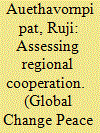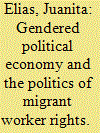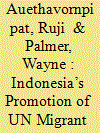| Srl | Item |
| 1 |
ID:
154338


|
|
|
|
|
| Summary/Abstract |
Existing studies of Association of Southeast Asian Nations (ASEAN) states’ engagement with migrant worker rights focus on the experience of such workers from gender, labour and security perspectives. As such, these studies are yet to consider the broader impact of migrant worker rights on the process and nature of cooperation between ASEAN members. This article addresses this gap by framing migrant worker rights within the broader human rights socialization ongoing within Southeast Asia, driven by both members of ASEAN and external stakeholders. It argues that, contrary to many existing accounts of norms as creating shared commitments, migrant worker rights have led to considerable contestation, often driven by diverging national approaches to the issue. This article examines the impact of migrant worker rights norms on Thailand, the largest labour-recipient state in ASEAN. It asserts that Thailand’s diverging experience is caused by the lack of norm precision, resulting in the applicatory contestation of such norms.
|
|
|
|
|
|
|
|
|
|
|
|
|
|
|
|
| 2 |
ID:
094028


|
|
|
|
|
| Publication |
2010.
|
| Summary/Abstract |
Focusing on the South-East Asian region and looking specifically at activism around the position of migrant domestic workers in the region, this article seeks to evaluate why migrant activist organisations appear to have had, at best, modest influence on gendering the International Labour Organization's approach to labour rights. The author argues that this is largely due to how dominant understandings of labour rights have neglected the significance of social relations of reproduction (i.e. those 'care-related' activities associated with the household) to the functioning of the labour market. Furthermore, a transnationalisation of social relations of reproduction is manifested in the increased feminisation of labour migration in the region and this highlights further problems with dominant labour rights perspectives that remain largely state-centric in their approach. The significance of South-East Asian states in promoting localised regimes of citizenship/immigration and industrial relations greatly limits the ability of activist groups to claim and utilise the language of human rights. Nonetheless, the article argues that a concern with the human rights of female migrants can potentially destabilise dominant understandings of labour and human rights. More generally, the article seeks to demonstrate the insights that a critical feminist human rights approach can bring to studies of work and employment within international political economy.
|
|
|
|
|
|
|
|
|
|
|
|
|
|
|
|
| 3 |
ID:
184240


|
|
|
|
|
| Summary/Abstract |
Scholars have devoted insufficient attention to Indonesia’s foreign policy on migrant worker protection, especially as mobilized in multilateral institutions. This article addresses such knowledge gaps by analyzing why Indonesia has, for almost two decades, persistently promoted the United Nations Migrant Worker Convention in the Association of Southeast Asian Nations (ASEAN) despite constant pushback from migrant-receiving countries. It argues that Indonesia’s persistence is driven by its locally constituted meaning of migrant worker rights. In particular, this article advances the critical norms approach in international relations to demonstrate that its interpretation is influenced by “Indonesia’s normative baggage,” or past experiences with labour migration that have too frequently dealt with the exploitation of Indonesian citizens abroad. This normative baggage in turn shapes the country’s diplomacy and promotion of convention standards deemed appropriate for safeguarding Indonesian migrants in ASEAN. In presenting the argument, this article contributes to the study of labour migration by scrutinizing Indonesia’s foreign policy on migrant protection and unpacking norm interpretation processes that are necessary in international negotiations.
|
|
|
|
|
|
|
|
|
|
|
|
|
|
|
|